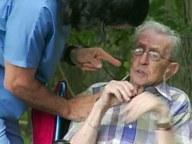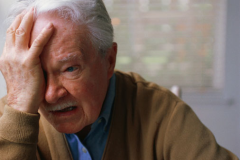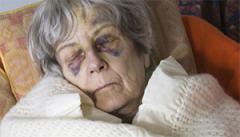The Telegraph
Patients ‘were locked up’ at criticised NHS hospital

John Marchant, the former head of security at Dudley Group of Hospitals NHS Foundation Trust
The Department of Health has ordered an investigation into claims that vulnerable patients have been detained against their will.
By Patrick Sawer, and Laura Donnelly
Elderly patients and children at one of the country’s largest hospitals have been locked up and restrained against their will, a whistleblower has claimed.
John Marchant, the former head of security at Dudley Group of Hospitals NHS Foundation Trust, said staff had routinely forced vulnerable patients to stay in their rooms – or even confined them to their beds – despite them posing no danger to anyone.
In an interview with The Telegraph, Mr Marchant said his security guards had become so concerned about the practice that in one instance, they had refused to restrain a child and warned bosses the action was illegal

The Department of Health last night ordered the Care Quality Commission, the health regulator, to carry out an investigation into the claims.
“These are very serious allegations and we have passed this information to the Care Quality Commission for further investigation,” a spokesman said.
“We are absolutely clear that physical restraint should only ever be used as a last resort and it should be used for the shortest time possible. There are strict conditions that must be met before any patient is restrained or detained.”
Charities said they were appalled by the “outrageous” treatment of some of the NHS’s most vulnerable patients.
Earlier this year the Dudley Group was was one of 14 hospitals criticised by Sir Bruce Keogh, the NHS’s medical director, after he investigated unusually high death rates at the trust.
His inspectors found inadequate numbers of qualified nursing staff, senior nurses left in charge overnight instead of doctors, and patients shunted from ward to ward up or kept waiting for hours on trolleys because of bed shortages.
The Dudley Group last night denied Mr Marchant’s claims and insisted it always acted in the best interest of patients. However, it admitted that security staff had raised concerns about the issue.
Mr Marchant, who was in charge of security for more than ten years until late 2012, told The Telegraph that he feared hospital managers were ignoring the welfare of patients in order to make life easier for nursing and medical staff.

Laughing at the most vulnerable
“In many cases we are talking about patients known as ‘bed blockers’, elderly people unable to return home or with no residential care unit to go to,” he said. “In these cases detention is being used simply because the patient become so frustrated at not even being able to go out for a walk in the hospital grounds because there are no staff to accompany them.
“Some would go back to their rooms if you asked them, but others would have to be closed in and it would be very distressing for them.”
Mr Marchant grew so concerned about the number of requests for his security guards to detain patients that he sought the advice of a London chamber of barristers.

Who will defend her?
Their report outlines how security guards at the hospital, acting under the instruction of medical staff, would restrain patients – often vulnerable adults – for “prolonged periods of time” and without a proper assessment of their mental capacity or of any risk they pose to staff.
It states that patient have been restrained for up to 12 hours and that during one two week period alone medical staff asked security guards to intervene on 80 different occasions.
The report went on to say that “many of the incidents for which security guards have been asked to intervene could be seen as violations of both the criminal and civil law”.
A separate incident report, also seen by this newspaper, shows that on one occasion, in May 2011, security guards refused to restrain a child on a children’s ward, fearing that they would have been acting illegally.
A further incident report, from April last year, detailed how ward staff had frequently called security guards to deal with what they described as a “violent” patient, only for the guards to find that while the patient in question was being difficult, there was no evidence of violent behaviour.
The report stated: “Security must be called if violence is threatened or takes place. However, elderly patients who just want to walk around the ward are a nuisance, but if there is no threat of violence are best dealt with by appropriate staff.”
In August the Commons health select committee warned that vulnerable patients were being left at risk of abuse due to “profoundly depressing and complacent” attitudes by staff at hospitals and care homes who were restraining patients needlessly, with no heed to laws to protect patients.
Deprivation of liberty safeguards (Dols), to protect people who lack mental health capacity, were introduced in 2009, in an attempt to end the scandal of dementia patients being locked up and restrained without justification.

Bringing European socialism to America
However, investigations found elderly people in care homes and hospitals have been subjected to “blanket restrictions” such as locked doors on wards and day rooms – simply make life easier for staff.
Security managers at the Dudley Group held a series of meetings with senior executives to warn them that the detention of patients without a proper assessment under the Mental Health Act or the Mental Capacity Act could be unlawful.
They warned that the trust was leaving itself open to legal action for false imprisonment and assault, as well as offences under the Human Rights Act.
Mr Marchant, who was made redundant from the Dudley Group in December 2012, said he first became aware in 2010 of an increasing number of requests by medical staff for security guards to restrain patients.
The methods used ranged from telling someone to go back to their bed, to pushing a patient back into their room or holding the door closed so they could not leave.
Mr Marchant added: “In many of these cases medical staff had not carried out a proper assessment to determine if it was necessary for the patient to stay in hospital because they don’t have their full faculties.”

Action on Elder Abuse, which campaigns on behalf of the elderly, said it was deeply concerned about the claims. Gary Fitzgerald, the charity’s chief executive, said: “It is shocking that older people should be treated so appallingly. They have the same rights as everyone else, and that includes the right to be treated within the law. These people are some of our most vulnerable, and this abuse makes a mockery of the NHS mantra to ‘do no harm’.“

Paula Clark, chief executive of the trust, said: “We emphatically refute the suggestion that we have ever unlawfully restrained patients at The Dudley Group. The health and well being of our patients is our absolute priority and we always act in the best interests of our patients.
“It is our priority not to restrain patients. In the very small instances where this is necessary, it is to prevent patients harming themselves. Any kind of restraint is always reasonable and proportionate, and in line with our policy. Our policy has been held up as an example as good practice by our regional peer review of adult safeguarding.”

“We have to pass the bill so that you can
find out what is in it.” – Nancy Pelosi
Read this in its native environment: http://www.telegraph.co.uk/health/heal-our-hospitals/10550923/Patients-were-locked-up-at-criticised-NHS-hospital.html

